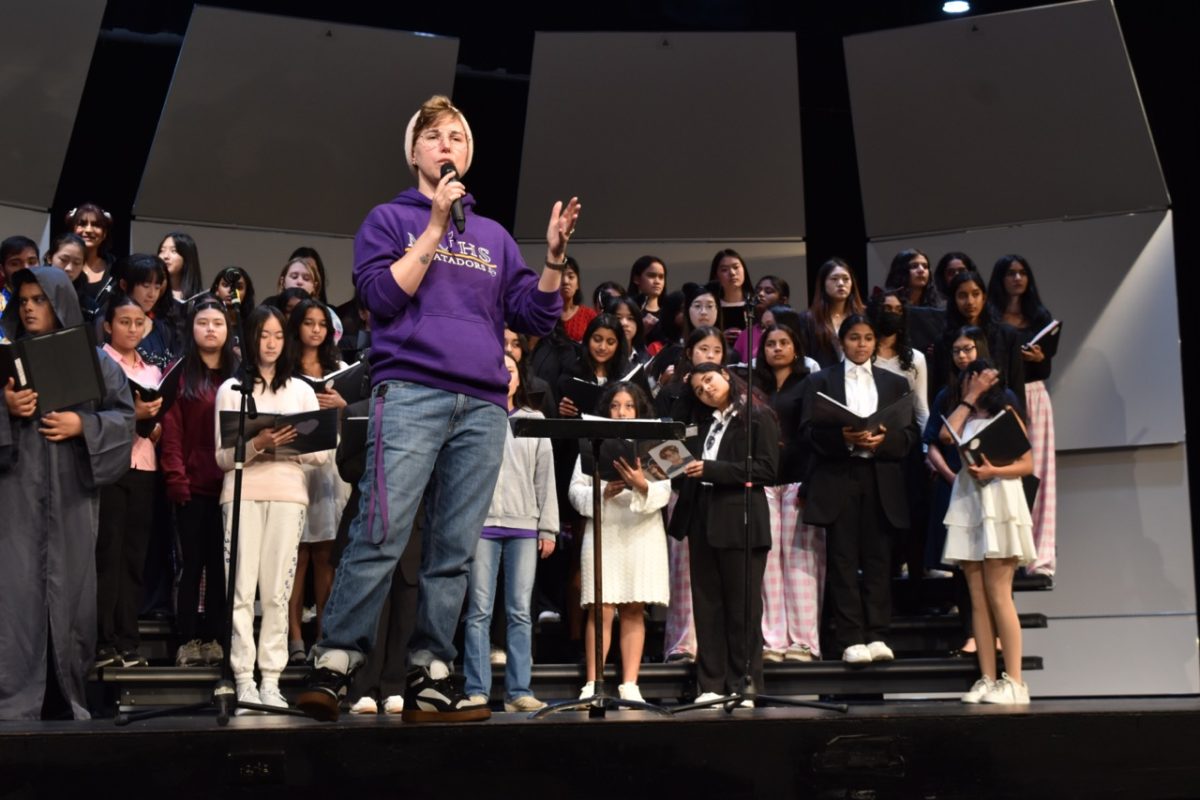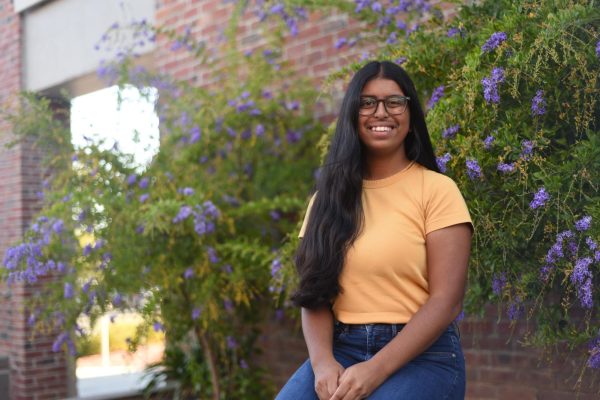EE: During a 2018 trip to China for an international choral festival, music department chair and choir teacher Lofn Young climbed to the top of the Great Wall of China and sang in a choir composed of choir teachers from around the world. Despite hardly anyone in the group knowing the same languages, Young recalls the deep level of connection they achieved through music.
LY: There weren’t really needs for translators, because a lot of what we were doing was in the music, and we were able to just point and say, “We’re gonna start here.” We all know how to count off together, and we all know how to sing and read music, and it was really cool to see the transcendence that music can bring across these boundaries that would otherwise keep us from being able to connect. It really was magical. We didn’t understand the words, but we understood the sentiment and the energy of it.
EE: Young says they’ve always considered music a form of creative expression, ever since their childhood obsessions with the Backstreet Boys and Spice Girls. They particularly enjoy the feeling of being understood that comes with connecting with music.
LY: You discover parts of yourself when you find an artist that just says something that you’re like, “Yes, I’ve been looking for someone to say this thing that I knew I felt somewhere, but I didn’t have the language for it.”
EE: For junior Savir Malhotra, music goes beyond just reflecting his emotions, to helping him process those emotions. In fact, having sung in choir for eight years and made some of his own music, Malhotra says music has been his most significant form of therapy.
SM: Before I actually got into real therapy, it was just music. So I would have some feelings — maybe I was depressed or anxious about something at a certain period in my life — and I would just play music. And it would sort of bring me back to the ground and say, “OK, everything is OK.”
EE: While music can be helpful in difficult times, senior Emily Martin emphasizes that it’s important to be aware of a song’s message, recalling that listening to music with pessimistic lyrics has hurt her mental health before. At the time, she sought advice from her church pastor, who told her to look for songs with more uplifting lyrics.
EM: I was pretty mad because I really liked listening to that music. And I was like, “Why would I stop listening?” But then I decided to try not listening to that not-positive sort of stuff. And then that’s when I discovered my favorite Christian music. It could be positive, it could have a good message, but it could also sound really, really good, and match my music taste.
EE: Like Martin, Malhotra and Young both consider the message essential to the therapeutic value of music. Malhotra remembers performing a solo of Taylor Swift’s song “Marjorie” at last year’s Valentine’s Day concert to commemorate the death of his grandmother, because he wanted to convey the message that those who have passed can be remembered and celebrated, not just grieved. Similarly, Young says they sometimes choose songs for choir with the hope that students will connect emotionally with the message.
LY: We just did a piece on our first concert called “Earth Song” that talks about this dark, stormy hour, the wind, it burns, oh, war and power you scorn, but music and singing have been my refuge, and music and singing will be my light. Through darkness and pain and strife, I’ll sing. And sometimes, having those messages can really be very healing and helpful and something that kids can kind of hold on to as a meaningful experience. And I think it did. It did that. Everybody really loved that song, and I’ll remember that.
EE: Additionally, in their pursuit of a music therapy degree at Florida State University, Young has completed thorough research on what specific benefits choral singing has and why it is so powerful. Singing in a group boosts the immune system, reduces stress, aligns heartbeats and even releases oxytocin, the same trust hormone released when playing team sports. Although Martin herself does not perform in a choir, she recalls feeling some of the same benefits by performing in her church band.
EM: Being around the people there, being able to participate in all the fun activities they had and just feeling like you’re a part of something is really important. They have like these small group meetings, and I was so shy that I didn’t want to participate in any of those. But after joining, I definitely felt like I had a lot more confidence. So I decided I would try out participation. And now I go there every week.
EE: After noticing that music provides both emotional and physical benefits, Young began working in deaf music education. They found that through the physical vibrations, deaf people can experience the same mental benefits as people with full hearing, and that “music is in the mind.” Even now as a choir teacher, Young has been methodical in implementing musical mindfulness in their classes to help their students cope during the colder, stress-heavy months.
LY: I like to align it with the dark, sad months, because I find it’s when my students need that time the most, really just carved out for them. It’s a lot of expressive exercises that we can do at the beginnings of classes, and then obviously it helps them be more in their bodies while they’re singing, which obviously also is kind of a somatic experience, and helps with that kind of relationship with our bodies that we really need to always be focusing on as well.
EE: Despite the physical benefits that music provides, Malhotra stresses the importance of asking for professional help as needed when it comes to regulating mental health. After realizing the lack of mental health support students often face, he founded EXHALE Wellness, a nonprofit aiming to bring mental health awareness and support for students in underprivileged communities. Driven by his own experience with music, he has included music-based exercises in the curriculum as a method to process emotions.
SM: There have been times when I was not in a good place mentally. I was struggling a lot where music just wasn’t enough, and I had to take another step. And I think that’s OK — it’s OK to accept that you’re in this place, and then to find the help you need, and that’s one of my goals for my life is to have people be able to get the resources they need.
EE: Though music is routinely a method of self expression and an emotional outlet for Malhotra, it also keeps him grounded during stressful times. For example, he specifically recalls choir assisting him through the stress of last year’s winter finals.
SM: I think the spirit of choir and the songs that we did brought me a sense of happiness, and it brought me a sense of calm, like, “OK, everything is OK. You have this group that you’re a part of, you’re gonna go perform. That’s something good that’s in your life happening right now. Be in the moment. Enjoy it.”
Music: “Lift” by Starluxe via Artlist












